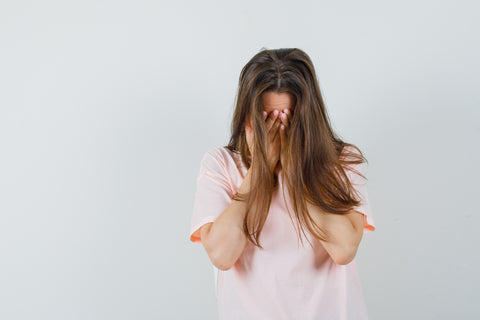Effects Of Depression & Anxiety
Researchers point to the fact that depression and anxiety can be very dangerous as they may significantly increase the risk of stroke, sudden cardiac death, cancer, suicide, addictive behaviours, migraines and headaches, osteoporosis, asthma, autoimmune diseases, Alzheimer’s disease, hormonal imbalance, and other health problems.
Depression can make people up to 7 times more likely to lose their jobs. If you are employed depression may lead to a loss of about 35% in lifetime income.
Main Symptoms Of Depression
The following symptoms are associated with depression:
- Fatigue (tiredness),
- Sadness,
- Feelings of emptiness,
- Agitation or irritability,
- Lack of interest in daily routines,
- Problems with falling asleep, waking up too early, or constant sleepiness,
- Slower body movements,
- Feelings of worthlessness,
- Problems with concentration,
- Morbid thoughts,
- Problems with appetite.
According to Dr. Nedley if you experience at least half of the listed above symptoms for the most of at least two weeks, you can be almost certain that you suffer from a condition called major depression. Experiencing less than 50% of these symptoms indicates minor depression, which untreated will eventually lead to major depression.

Types Of Depression
There are 4 main types of depression:
- Major depression involves at least five of the above listed symptoms for at least two-week period. Major depressive episodes may occur once or twice in a lifetime, or they may recur frequently. They may also be triggered by a romantic breakup, the death of a close person, a medical illness, or other stressful experiences. Some individuals with major depression may attempt to commit suicide.
- Persistent depressive disorder (PDD) (formerly called Dysthymia) is a form of depression that usually continues for at least two years. Although it is less severe than major depression, It involves the same symptoms as major depression, mainly low energy, poor appetite or overeating, and insomnia or oversleeping. It can manifest as stress, irritability, and mild anhedonia, which is the inability to derive pleasure from most activities. People with PDD might be thought of as always seeing the glass as half empty.
- Bipolar (Manic) Disorder includes major mood swings, when periods of depression alternate with periods of mania. When manic, they are in a state of high excitement, and may plan and may try to carry out over-ambitious schemes and ideas. They often then have periods of severe depression.
- Seasonal Affective Disorder (SAD) is a seasonal depression which is related to day length. It usually comes on in the autumn and winter, when days are short and the sun is low in the sky, and gets better as the days get longer and brighter.
These four main types of depression can occur with any of the anxiety disorders.
Other types of depression include the following:
- Psychotic depression is a rare form of depression accompanied by a distorted view of reality, If you are very depressed, you may get hallucinations or delusions. Atypical depression – features include excessive eating or sleeping, a “leaden” feeling in the limbs, and being sensitive to rejection by others.
- Antenatal and Postnatal (Postpartum) Depression (PPD) – triggered by pregnancy or childbirth. About 10 per cent of pregnant women and 16 per cent in the three months after birth may suffer from depression.
- Premenstrual Dysphoric Disorder (PMDD) is a severe form of premenstrual syndrome (PMS) that interfere with social activities, work, and relationships.
- Situational (Reactive) Depression is characterized by the development of symptoms in response to a specific and possible to identify stressful situation.
- Atypical Depression is a type of depressive condition that produces some symptoms not usually found in people suffering from depression.
- Melancholia – a less common and more severe form of depression which causes slowed movements and a complete loss of pleasure in everything.

Anxiety
It is very important to get rid of prolonged periods of anxiety because it greatly weakens immune system and often leads, or at least greatly contributes, to numerous autoimmune diseases which are very difficult to recover from and much more prevalent among women than men. Also young women who suffer from anxiety have 80% higher risk of developing Alzheimer’s later in life! It is important to know about those risks and if possible read the chapter “Mind Cure” from Ministry of Healing to realise how dangerous worrying is.
Differences Between Depression & Anxiety
I decided to deal with these two conditions at the same time because although there are some differences between them with regards to symptoms yet the lifestyle and nutritional causes as well as herbal remedies, supplements and other elements of natural treatment are basically the same.
Depression, and anxiety are often triggered by life events – and the symptoms are not easily separated. According to Harold Cohen, Ph.D., “Depression generates emotions such as hopelessness, despair and anger. Energy levels are usually very low, and depressed people often feel overwhelmed by the day-to-day tasks and personal relationships.
A person with anxiety disorder, however, experiences fear, panic or anxiety in situations where most people would not feel anxious or threatened. The sufferer may experience sudden panic or anxiety attacks without any recognized trigger… Both anxiety and depression are frequently treated in much the same manner, which may explain why the two disorders are so often confused.
Antidepressant medication is often used for anxiety, while behavioural therapy frequently helps people overcome both conditions.”
Causes Of Anxiety
There could be many different causes of anxiety including imbalance of sex hormones (progesterone and oestrogen), prolonged stress, low serotonin, dopamine or PABA levels, poor colon health (insufficient amount of probiotic bacteria in colon, leaky gut syndrome, etc.), nutritional deficiencies (tryptophan, magnesium, zinc, B complex, omega 3, vitamin D), sedentary lifestyle, hypoxia, lack of sleep, lack of sunlight, etc.

Key Causes Of Depression
- Low Serotonin levels! It is a well-known fact that people who have depression, those who commit suicide or serious crime as well as people who are obese have very low levels of this extremely important hormone. And the main cause of serotonin deficiency are stimulants, bad diet (low in Tryptophan, B vitamins – especially B12, B3, B6, D3, and Folate), Zinc, Magnesium and Complex carbohydrates), and lack of sunlight and exercise: In the book Natural Way to Overcome Depression, Obesity, and Insomnia, Dr. Michael Murray says that serotonin deficiency should be blamed for causing depression: “Bad diet, lack of exercise, use of harmful substances such as caffeine or alcohol can rob your brain of the ability to make enough serotonin. This produces a range of significant complications: depression, obesity, insomnia, migraine headache, chronic fatigue.”
- Nutritional deficiencies (low in nutrients refined diet). According to DR. Stephen Shouber, „A deficiency of any single nutrient can alter frontal lobe function and lead to depression, anxiety, and other mental disorders.”
- Diet low in amino acid Tryptophan. Tryptophan is required to produce serotonin in our brains. Deficiency of this amino acid therefore will lead to low serotonin and depression.
- Artificial sweeteners (Aspartame, NutraSweet, Splenda, etc.). Many now believe the one of the main causes of depression (especially in America and some other countries) is aspartame ( NutraSweet, Equal, etc.) It is very common among people suffering from depression to have a habit of drinking a lot of diet drinks (e.g. Diet Coke or Diet Pepsi), or consume different diet foods. And as soon as those individuals get depressed they go to their doctor and get a prescription for Prozac. This, however, starts a never-ending cycle of increasing levels of harmful antidepressants without being told to stop using aspartame (which causes depression)!”
Ann Blake Tracy, PhD, who has treated many patients who decided to stop taking Prozac wrote the following statement: “It is rare for me to interview someone who is using Prozac who is not drinking at least a gallon or generally two to three gallons per day of diet soda sweetened with NutraSweet! However, although in many cases aspartame can be the key cause of depression, there are many other causes as well, which combined with aspartame make symptoms much worse.
Aspartame is known as an ‘excitotoxin’ because it stimulates brain cells far beyond their normal state. This stimulation can actually lead to brain cell death. Another excitotoxin is monosodium glutamate, also known as MSG. Hydrolysed Vegetable Protein (HVP) frequently has MSG added to it. They are also known by many other names and are added to almost all junk foods.”
Also Dr Lawrence Wilson blames artificial sweeteners, MSG, caffeine, and other dangerous chemicals for causing depression and anxiety: “Nutrasweet (also labelled as Equal, Canderel, Spoonful, aspartame, aspartic acid, neotame or phenylalanine) is notorious for causing brain fog, fatigue, dizziness, depression and panic attacks, to name just a few of its symptoms. It is found in over 5000 products and affects some 25% of Americans who use it. It is often hidden in prescription medication, vitamins, toothpaste, breath mints and all types of diet products.
Everyone should avoid this food chemical. Other food chemicals that affect sensitive people include excitotoxins such as MSG (monosodium glutamate), caffeine, pesticide residues, bacterial and fungal toxins, fluoride, chlorine (water) and hundreds of other substances that either contaminate or are added to drinking water and food.
Caffeine and other stimulants can give one a boost, but eventually contribute to adrenal exhaustion.
- Insufficient exposure to sunlight by leading to low serotonin, melatonin and vitamin D levels contribute to depression and anxiety.
- Lack of Exercise as it leads to low serotonin, dopamine, endorphins, etc.
- Sugar, refined products (white flour products, white pasta, white rice, etc.). Diet high in refined carbohydrates such as refined sugar contributes to depression and anxiety because sugar leads to nutritional deficiencies. It causes lack of magnesium, calcium, zinc, chromium and vitamin B complex and without them our nervous system can’t function properly. Apart from that, sugar causes hypoglycaemia effect (mentioned earlier) and dopamine deficiency. All those factors greatly contribute to chronic fatigue, mental disability and depression. As a result the exhausted brain is looking for something to boost its energy. For this reason it may create sugar craving to elevate blood glucose or it may increase your desire to use stimulants such as alcohol, caffeine, or drugs (which also contribute to depression) to increase energy.
- Another factor which contributes to depression, anxiety and mental sluggishness is overgrowth of yeast called Candida albicans as a result of sugar consumption as people who suffer from depression, anxiety, schizophrenia, ADHD, and autism also have an overgrowth of a yeast called Candida albicans which feed on glucose from sugar.
- Hypoglycaemia (low blood sugar/glucose level). The key cause of hypoglycaemia is of course refined sugar and other refined carbohydrates including white flour products, refined rice, white pasta, and all foods and drinks which contain refined sugar, such as ice creams, desserts, cakes, carbonated drinks, etc.
When you consume anything with refined sugar it almost immediately gets into our blood because the sugar is separated from fibre. As a result the sugar level goes dangerously high.
Therefore, in order to solve the problem pancreas produces insulin which gets into your blood and lowers blood glucose. And for some time everything seems to be alright, in spite of this bad habit. Unfortunately, if you keep on consuming refined products for a longer period of time, your pancreas may become so exhausted that it starts making mistakes. It may start producing too much insulin thus lowering blood sugar (glucose) way too much.
As a result now your brain is effected by the low glucose levels because it is brain’s key source of energy. And since your brain doesn’t have enough fuel in the blood it produces all sorts of negative symptoms including depression, anxiety, or even suicidal thoughts!
And the only way to recover from hypoglycaemia and its symptoms is by avoiding sugar and all refined foods as well as regular physical activity. Unfortunately, it usually takes months for the symptoms to disappear.
- Nutritional deficiencies (diet low in vitamins and minerals).
- Stimulants (Caffeine, Alcohol, Drugs, Cola drinks, etc.). According to Dr. Agatha Thrash, “Since caffeine first stimulates the nerves than causes depression, presence of fatigue in those who use caffeinated drinks is common. It is a fact that the commonest complaint in physicians’ offices today is that of fatigue. Yet, many people mistakenly believe that coffee helps them get through a difficult day. In addition to fatigue, mental confusion and depression also result from the use of caffeinated drinks. While caffeine drinks cause an immediate increase in the learning ability, the overall result is a decrease in learning; the physical fatigue resulting from pharinacologic depression of the nervous system produces emotional depression, leading to a reduction of interest in and retention of new material. Headaches are common among caffeine users, and often clear up after only a short period of caffeine abstinence–a week or two. Headaches may occur as a caffeine-withdrawal symptom; some people are so sensitive that they get a headache soon after drinking their last cup.”

Also Dr Lawrence Wilson states that caffeine may contribute to depression and anxiety: “Other food chemicals that affect sensitive people include excitotoxins such as MSG (monosodium glutamate), caffeine, pesticide residues, bacterial and fungal toxins, fluoride, chlorine and hundreds of other substances that either contaminate or are added to drinking water and food. Caffeine and other stimulants can give one a boost, but eventually contribute to adrenal exhaustion.”
- Arachidonic Acid (Meat). According to Dr. Greger, “Arachidonic acid in our diet produces inflammatory compounds which may inflame our brain. The omnivores ate 9 times as much arachidonic acid than the vegetarians, which is not surprising, given that arachidonic acid is not found in plants!”
- Gluten sensitivity. According to Dr. Osborne gluten sensitivity causes anxiety, depression, and migraine > There is also evidence that gluten may cause depression in people with non-celiac gluten sensitivity.
- Low Dopamine. According to Ward W. Bond, Ph.D., “The type of depressive-feeling caused by a lack of dopamine in the brain is a very low energy depression, with a complete lack of motivation. If you are low in serotonin, you would be craving carbs (sugar), dairy or even bananas. If you are low in dopamine, then you tend to reach for stimulating foods such as coffee or chocolate. If your problem is not with serotonin, but only a lack of dopamine, then you probably won’t feel much anxiety. You probably also won’t have trouble sleeping, but you will have trouble getting going in the morning. If you over-increase your dopamine so that it’s too high, you’ll feel angry at things that wouldn’t normally make you feel angry.”
- Parkinson’s disease (low dopamine) contributes to depression and anxiety.
- Hypothyroidism (Underactive thyroid) can cause depression. Thyroid hormone acts as a neurotransmitter and its deficiency may lead to low serotonin levels. So, if you experience depression symptoms together with fatigue, cold sensitivity, constipation, etc. try to check your thyroid.
- Noradrenaline (Norepinephrine) deficiency. It works as both a hormone and neurotransmitter and is synthesized from dopamine, another mood neurotransmitter deficiency which may also be involved in depression and anxiety. Noradrenaline improves concentration but dopamine has a greater influence on cognition. Frequent stress is responsible for deficiency of this hormone because when we become stressed, norepinephrine is secreted to boost energy by increasing amount of heart contractions and blood flow to our muscles.
- Mercury, Lead, Fluoride and other neurotoxins which damage brain cells contribute to depression and anxiety.
- Sexual abuse.
- Sexual addictions, chronic masturbation, addiction to porno, etc.
- Stressful Events
- Medications such as Premarin (for menopausal symptoms), Accutane and Isotretinoin (prescribed to clear up severe acne), Valium and Xanax (insomnia drugs), Lopressor (prescribed to lower blood pressure); Lipitor (cholesterol-lowering drug), etc. If you are on drugs read the potential side effects and talk with your doctor.
- Watching depressive films and TV programs such as negative news.
- Insomnia and other sleep disorders. Sleeping more than 9 hrs/day or less than 6 hrs/day routinely.
- Spending too much time in chat rooms and on social-networking sites.
- There is no doubt, and I know it from experience, that spiritual starvation and neglecting spiritual aspect of life is one of the key causes of anxiety and depression. According to Jesus Christ no man can be really mentally and spiritually healthy if he feeds himself only with physical food: “Man shall not live by bread alone, but by every word that proceeds out of the mouth of God.” (Mathew 4:4)
- Hypoxia (deficiency in the amount of oxygen reaching the brain cells) caused by sedentary lifestyle, pollution, and rarely breathing fresh air. In addition, hypoxia impairs an enzyme involved in producing serotonin, which can lead to depression.
- Other causes include: High cholesterol levels, Stroke, Heart disease dementia, Alzheimer’s, Anorexia, Hepatitis C, Fibromyalgia, Recent head injury, Terminal cancer, Uncontrolled diabetes, Diet too low in complex carbohydrates, Regular exposure to syncopated rhythm music >, Going against your conscience.
Related Articles
- Can Probiotic Bacteria Promote Good Mood? | HealthAid
- How to Improve Mood and Emotional Health | HealthAid
- What Is Stress And How To Cope With It | HealthAid
Related Products
Any information or product suggested on this website is not intended to diagnose, treat, cure or prevent any medical condition. Never disregard medical advice or delay in seeking it because of something you have read on this website. Consult your primary healthcare physician before using any supplements or making any changes to your regime.





